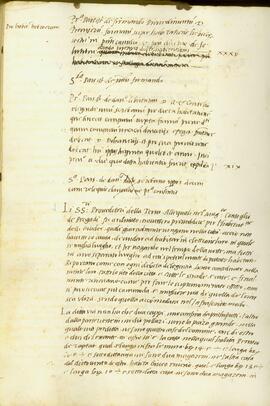- HR-DADU-24
- Fonds
- 1513-1526, 1543-1550, 1570-1577, 1581-1586, 1592-1596, 1609-1611, 1615-1627, 1634-1636, 1642-1815
From the 70s of the 16th centuries, the Criminal Court (established in 1459) began to systematically keep the registers Diversa et possessio de criminalibus and they were kept until the beginning of the 19th century. The registers contain court decisions made in accordance with the request submitted by the plaintiff, and sometimes ex officio. The fonds is characterized by decisions in which the court forbade the defendant to communicate with the plaintiff, either in person or through an intermediary, either by actions or with words (Ital. né per sé, né per interposte persone, né in fatti, né in parole), which was done to prevent escalation of the conflict. Until the judgement was publicly announced, the court would often confiscate disputed items or documents from the defendants. These facts were also recorded in the volumes of this fonds.
The fonds contains a large variety of information about Jews. The research shows that in slightly more than one third of the recorded cases the content of the documents indicates the existence of court prohibition of the communication between a defendant and a plaintiff. These decisions were made in equal numbers at the request of Jews against Jews, or at the request of Jews against other non-Jewish citizens. Also, the fonds contains orders for the eviction of tenants, bans of activities which could cause any damage to neighbour, bans on construction work and orders to maintain peace and order in the Jewish community. The fonds also contains lawsuits for physical and verbal violence. If the defendant did not comply with the court decision registered in the fonds Diversi e Possesso de Criminale, the plaintiff could sue the defendant again in regular proceedings by invoking that decision. Some notable Jewish people who are referenced to in this fonds are: Didacus Pyrrhus, David Coen de Herrera - father of Abraham Coen de Herrera, Zvi Esconasi, a famous rabbi of the Ashkenazi Jewish community in Amsterdam, who also was a rabbi in Sarajevo for a certain period (c. 1686- c. 1697) (vol. 19, f. 220v). The fonds also contains the will of Samson from the Peloponnese, which he registered in Dubrovnik in 1571 (vol. 4, f. 16). Generally, the fonds mainly references to members of Dubrovnik Jewish families such as: Abenun, Ambonetti, Angiolo, Asser, Azubi, Baruch, Bencastiel, Bensassen, Bueno, Campos, Chabiglio, Cohen, Costantini, Ergas, Esperiel, Fermo, Franco, Israel, Janni, Levi Mandolfo, Lima, Luzzena, Maestro, Miranda, Nahmias, Oef, Pappo, Pardo, Penso, Russo, Salama, Saralvo, Terni, Tolentino, Valenzin, Vitali, Volterra.
Chancellery and the Judicial Office of the Dubrovnik Republic

